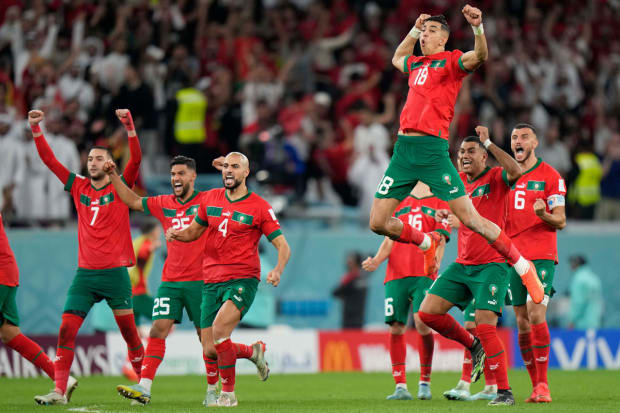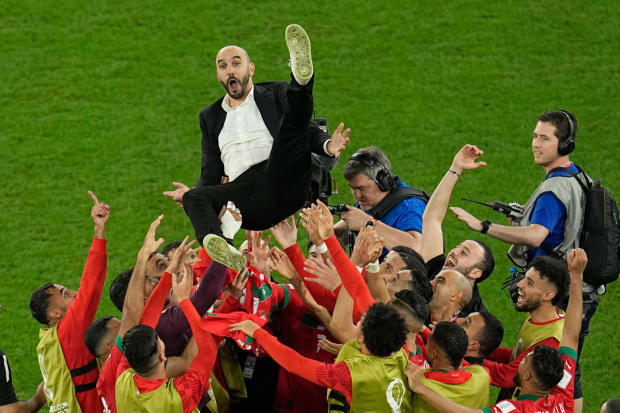Everybody always tries to read too much into major tournaments. A lucky penalty here, a brilliant save there, and suddenly the whole narrative changes. Back in 1982, when Algeria beat West Germany, Chile and Honduras battled hard and Cameroon went home undefeated, there was much breathless chatter about the dawning of a brave new world for football—and perhaps then, it was. For the first time, there was a recognition in Europe and South America that maybe the rest of the world knew how to play.
Forty years on, there had been plenty of similar commentary after the group stage, after three sides from the Asian confederation (Japan, South Korea, Australia), plus two African teams (Morocco, Senegal) and the United States made it to the last 16. And yet one round further on, and we’re back with a familiar list of quarterfinalists: Brazil, Argentina and a bunch of Europeans. Perhaps the last 16 is a sign of things to come, but let’s give it another couple of tournaments before making definitive judgments. If there has been much change over the past four decades, since Europe and South America first noticed the rest of the world, it has been incremental.

Luca Bruno/AP
Thank goodness, then, for Morocco, whose penalty shootout victory over Spain means that, for the first time since Ghana in 2010, there is an African side in the last eight. It’s also the first North African side ever to make the quarterfinals, although Algeria will think back to how close it came against eventual-champion Germany in ’14, while Morocco itself will have memories of Lothar Matthäus’s very late winner for eventual runner-up West Germany in 1986.
Morocco’s progress should not come as a shock. This is not a freak, even if it has by far the lowest expected goals of any side left in the competition (less than three total, through four matches). In footballing terms, Morocco probably vied with Senegal as the best side at the Africa Cup of Nations earlier this year but, having dominated the first 10 minutes of the quarterfinals, allowed itself to be dragged into a brawl by Egypt and went out after extra time.
Since then, Vahid Halilhodžić was replaced as manager (the third time he has suffered the fate of qualifying a side for the World Cup and then missing the tournament itself), marking for a coaching change mere months before the start of the competition. The move to Walid Regragui in late August at least allowed for the return of Chelsea winger Hakim Ziyech, who had fallen out irreconcilably with Halilhodžić and had seemed to be through on the international stage. And that, in turn, means that Morocco has a serious attacking threat down both flanks, rather than being reliant on Sofiane Boufal on the left. Ziyech’s runs also create space for PSG star Achraf Hakimi to get forward from right back.
Regragui’s approach has essentially been the same in all four games so far: sit deep, and then counterattack down the flanks. And it has been devastatingly effective.
“Morocco offered absolutely nothing,” said Rodri, who had been operating at the heart of the Spain defense. “Without disrespecting them, in the game they did nothing. They just waited for the counters. They stayed behind and tried to counter us."

Abbie Parr/AP
But that is more indicative of and a reflection on a certain strand of Spanish football thinking rather than with how Morocco played. There are those, Xavi among them, who regard the post–Cruyffian Barcelona style as somehow a moral good, rather than simply the best way to win football matches (a sanctimony from which Pep Guardiola, despite inspiring many who appear to think that way, seems almost immune). But passing the ball is not the aim of football; it’s a means to an end.
Morocco played Tuesday’s match perfectly, helped by a monumental performance from its central midfielder, Sofyan Amrabat. It’s unlikely anybody will come out of this World Cup with their reputations quite so burnished than that of the Fiorentina star. The days when a good World Cup would guarantee a clutch of players big moves may have gone—scouting is more sophisticated than that these days—but Amrabat may be one whose performances have been startling enough to attract major interest in January.
The 26-year-old’s form is one of the elements that mean the World Cup retains its magic. There is no secret to Morocco’s form. It has good players who have been well organized by Regragui, conceding only an own goal in the whole tournament so far, while never lacking a threat. It is playing with a patriotic passion fueled by the fervent backing of fans from across the Arab region. Ziyech is not always the most industrious player, but in Qatar he has been a dynamo. National football always brings with it a slightly different dynamic.
It may be enough to beat a renascent Portugal to provide Africa with its first World Cup semifinalist. But even if Morocco falls at that hurdle as others have before, it has given the first Arab World Cup the first Arab-speaking quarterfinalist and has, even if only temporary, loosened the stranglehold of the old footballing powers.







